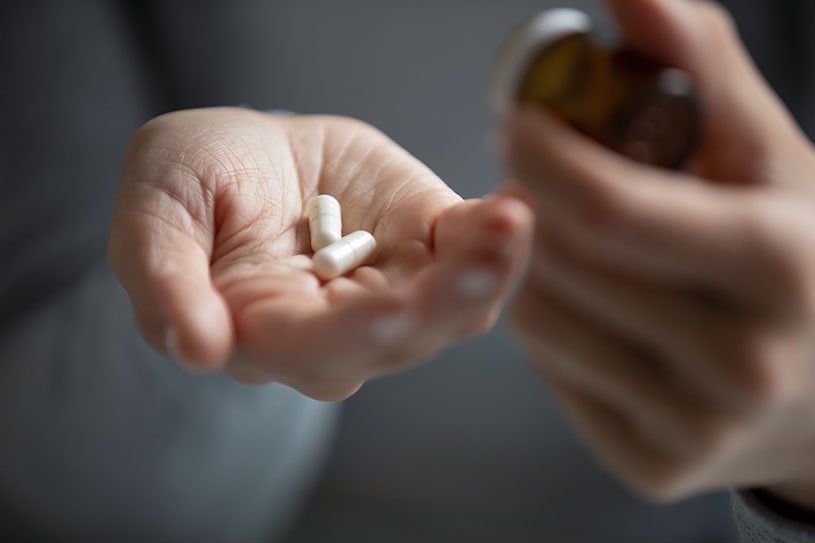A medicine’s interactions with other drugs can lead to serious health complications. This is why it is important to be adequately informed about all the drugs and substances that interact with a particular medication before administering it. Combining antidepressants like Bupropion with drugs or substances that react negatively will not only lead to physical damage to the organs but will also cause a strain on the patient’s mental health in many cases.
Table Of Contents:
This article will describe interactions of Wellbutrin and alcohol, marijuana, psychostimulants, and other antidepressants. This is to ascertain which medication works perfectly with Bupropion and which one can cause serious damage to human health. The article will also highlight how to safely use the medication without complications.
Wellbutrin And Alcohol: Can One Drink When Taking Bupropion?
Can one drink alcohol while taking Wellbutrin? The drug is generally not recommended to be taken with any drink, because this combination can increase adverse reactions of both substances, and even be lethal for a patient. Drinking on Bupropion is known to magnify the side effects of Wellbutrin and is associated with Wellbutrin induced overdose.
Some of the Side Effects of Drinking on Bupropion Include:
- Vomiting
- Hallucinations
- Paranoia
- Severe shaking
- Tremors
- Confusion
- Disorientation
The drug is known to have sexual side effects of Bupropion as well. Drinking on Bupropion may also result in aggressive behavior. A case published in the International Journal of Risk and Safety in Medicine tells about a patient who was prescribed Bupropion, which he accidentally mixed with liquor. This combination of Wellbutrin and alcohol caused an unexpected aggressive behavior, which wasn’t known to him before, and made the subject assault his wife. The aggressive behavior was later explained as a result of Bupropion-alcohol interaction.
In some cases, the combination of Bupropion and alcohol has proven to be lethal. Deaths due to this deadly concoction may result from substance interaction, toxicity, and subsequent overdose. Death may also be the consequence of the high intensity of side effects experienced, including violent seizures, confusion, and hallucinations.
When Is It Safe To Drink Again?
Bupropion half-life is up to 37 hours. That means a single dose taken with a Wellbutrin prescription can stay in the body for up to more than three days. The quantity, frequency, and length of period since taking the medicine all affect whether a person will experience Wellbutrin withdrawal symptoms. When Bupropion has left the patient’s body it is considered safe to have a drink of alcohol. It is essential to note that people who are undergoing withdrawal from sedatives or alcohol are contraindicated to take Bupropion. While reports indicate that some people can tolerate combining alcohol with
Wellbutrin, it must be noted that consequences can be random and unpredictable. Since Bupropion generally lowers an individual’s threshold for alcohol tolerance, extreme caution must be observed when mixing Bupropion with alcohol.
Wellbutrin And Marijuana
To determine how Wellbutrin and Marijuana interact, it is important to consider their mechanisms of action. Bupropion is an antidepressant that blocks the reuptake of dopamine and norepinephrine resulting in the production of more serotonin, dopamine, and norepinephrine. This action alters and lightens a person’s mood. Marijuana, on the other hand, works by antagonizing the CB1 receptor. This action changes a person’s perception, memory function, and learning. Users of marijuana are prone to make impaired judgments. The combination of both drugs can increase irritability, depression, insomnia, and tension.
Thus, patients are usually advised to steer clear of marijuana when using drugs such as Bupropion, especially when starting the treatment. This is because, just like other psychoactive substances, marijuana may interfere with the effects of antidepressants on the central nervous system. Also, it makes it hard to determine if the medication is working or if a patient is experiencing side effects.
Wellbutrin Interactions With Antidepressants
Bupropion is classified as an NDRI antidepressant. Using it alongside other antidepressants such as MAOIs and SSRIs could lead to a more pronounced effect on the system. Their interactions will vary according to the specific type of antidepressant and may lead to mild, moderate, or severe adverse reactions.
Wellbutrin and Lexapro (Escitalopram)
Using Wellbutrin and Lexapro together will lead to a major drug interaction. Wellbutrin and Lexapro, though effective in treating depression, belong to different drug classes and have dissimilar mechanisms of action. Lexapro, an SSRI, blocks the reuptake of serotonin by neurons, thus increasing serotonin. This action improves the mood and energy levels of the user. Bupropion, on the other hand, increases norepinephrine and dopamine by inhibiting their reuptake. Combining Wellbutrin and Lexapro leads to higher response and symptoms remission rates according to one study. However, taking both Wellbutrin and Lexapro can also have dire consequences.
Lexapro and Wellbutrin significantly increase the chances of the patient having seizures – something unlikely to happen if either drug is used alone. The chances of having a seizure become even more pronounced if the patient is elderly, undergoing withdrawal from a drug or alcohol, has a history of seizures, or has a medical condition that affects the central nervous system (such as head trauma or a brain tumor). The use of Lexapro and Wellbutrin should only be recommended by a medical doctor after a thorough examination.
Wellbutrin And Zoloft (Sertraline)
Wellbutrin and Zoloft are both metabolized by CYP2D6 (an enzyme that is expressed in the liver and the central nervous system). While clinical evidence of an interaction between the two may be lacking, plasma concentrations of selective serotonin reuptake inhibitors that are metabolized by CYP2D6 (such as Zoloft) may increase if combined with Bupropion. Additionally, in-vitro studies show that sertraline restrains the hydroxylation of Bupropion. Wellbutrin and Zoloft have dissimilar mechanisms of action. Sertraline increases serotonin by blocking its reuptake. This helps in the treatment of depression, panic attacks, post-traumatic disorder, and social anxiety disorder.
Combining Zoloft and Wellbutrin can improve antidepressant response and decrease the sexual side effects associated with both SSRI and SNRI medicines. The use of Zoloft and Wellbutrin together can increase the risk of seizures. These medications should be combined under the strict supervision of a medical doctor or treatment facility.
Buspar And Wellbutrin
Buspar and Wellbutrin belong to different drug classes and are used to treat different ailments. While Bupropion treats depression, Buspar treats anxiety and can help relieve some depression symptoms. Buspar and Wellbutrin have contrasting mechanisms of action. Bupropion increases norepinephrine and dopamine to help treat depression. Buspar’s moa is rather complex, but studies indicate its main neuropharmacological effects are mediated by the 5-HT1A receptors. Buspar increases serotonin, which helps to treat anxiety. Currently, there is no information on drug interaction between Buspar and Wellbutrin. However, that doesn’t mean no interaction exists. Consumers are therefore cautioned to consult health professionals before combining the drugs.
Wellbutrin And Prozac
Wellbutrin and Prozac are both antidepressants but belong to different drug classes. Prozac (Fluoxetine) is an SSRI (Selective Serotonin Reuptake Inhibitor) that works by blocking the reabsorption of the neurotransmitter serotonin. Serotonin is responsible for mood regulation, thus, the prevention of the reabsorption process leads to its increase in the brain. That, in turn, leads to the feeling of well-being. While Bupropion is useful in treating seasonal affective disorder, Prozac treats obsessive compulsive disorder, panic disorder, and bulimia. Studies indicate that Wellbutrin and Prozac are useful in treating major depressive disorder and alcoholism. However, there are side effects when both drugs are combined. Some include the increase in the risk of seizures as well blood levels of Prozac which may increase other side effects.
Cymbalta And Wellbutrin
Cymbalta and Wellbutrin are not of the same drug class. Cymbalta is an SNRI (serotonin and norepinephrine reuptake inhibitor) and its moa is to block the absorption of serotonin and norepinephrine to maintain a sense of well-being. Bupropion also treats depression by increasing dopamine and norepinephrine. Using Cymbalta and Wellbutrin together leads to a moderate drug interaction. The adverse effects of Duloxetine are significantly increased due to the higher levels of serotonin activity in the body. It also increases the chances of the patient having the Serotonin syndrome, characterized by symptoms such as:
- hallucinations
- confusion
- increased blood pressure and heart rate
- muscle spasms
- vomiting
- diarrhea
Combining both medications can also lead to an increase in the risk of suffering from seizures. Also, the combination of these medicines may cause an increase in the plasma concentration of Cymbalta. Patients with major depressive disorder are advised to consult a physician before administering the drug to prevent unwanted health issues.
Effexor And Wellbutrin
Individually, Wellbutrin and Effexor have slight chances of triggering a seizure in a patient. However, when used together, the chances of this are significantly increased, due in part to the higher levels of plasma concentration in the body. Patients with specific medical conditions that affect the central nervous system are more likely to experience these side effects than others. On that note, it is advised that the patient should avoid any activities that require mental alertness or involve handling hazardous machinery until it can be ascertained for sure how the medications affect them.

Bupropion Interactions With Stimulants
Stimulants are drugs that stimulate the central nervous system to produce pleasurable feelings and energize the user. Bupropion is an antidepressant that may be recommended to treat symptoms of ADHD. Thus, both drugs can be prescribed together to help treat patients who suffer from both depression and ADHD. Here are a few examples of Bupropion’s interactions with psychostimulants.
Adderall And Wellbutrin
Adderall is a medication that works by stimulating the CNS to increase serotonin, dopamine, and norepinephrine to produce pleasurable feelings. Bupropion also increases norepinephrine serotonin and dopamine, albeit through the use of a different mechanism of action to achieve the same effect. A combination of Adderall and Wellbutrin can lead to a major interaction that is heavily influenced by the strength of the doses – particularly the Adderall dose. Excessive use of psychostimulants in itself already poses a significant risk to the health of the patient, and using Adderall and Wellbutrin is likely to be the final trigger that tips them over into experiencing seizures. It may also increase some other side effects such as insomnia, agitation, and loss of appetite. Always speak to a doctor before administering any dose of both medications.
Wellbutrin and Vyvanse Interactions
CNS stimulants such as Vyvanse (Lisdexamfetamine) also lead to a major drug interaction with Bupropion. The risk of seizures is increased with concurrent use, so extreme caution and close monitoring are strongly recommended if they have to be taken together. Patients taking both medicines should stay off alcohol and activities that require concentration. This is because Wellbutrin and alcohol can have dangerous side effects. Also, the drugs may affect alertness and focus. People who take these medications must be strictly monitored by medical doctors for other adverse health effects.
Other Wellbutrin Interactions
Depending on the medication or substance, Bupropion can have severe to moderate interactions. However, some tricyclic antidepressants and fluoxetine, which is an SSRI, are well-tolerated when taken with Bupropion. Patients should speak to medical doctors before combining any drug with Bupropion to avoid any adverse health effects. Other drug alternatives, such as Wellbutrin vs Lexapro may be prescribed to help in treating a particular disease.
Wellbutrin And Gabapentin
Gabapentin is a drug that is used in tandem with other drugs to prevent seizures. It belongs to the anticonvulsants drug class and can be used to relieve nerve pains after a bout of shingles. The drug works by reducing abnormal excitement in the brain. There is no information of Wellbutrin’s interactions with Gabapentin, but that is no indication that there are no interactions. Always speak to your health provider regarding the possible side effects of taking this drug.
Wellbutrin And Caffeine
As suggested earlier, psychostimulants increase the risk of seizures when used alongside Bupropion. Caffeine intake must be closely monitored in the diet of the patient, as it can be found in many drinks such as coffee, tea, colas, energy drinks, chocolate, and some herbal/dietary supplements. Also, caffeine is known to increase the antidepressant-like activity of common antidepressants. Combining Bupropion with Caffeine may result in adverse consequences on the health of patients. Some side effects include irritability, insomnia, high blood pressure, and tremors. Patients are advised to stay off caffeine when treating depression to avoid an escalation of the disease.

Be On The Safe Side: Always Consult With Your Doctor
Do not take alcohol with Bupropion as it may have dire consequences. It is better to stay off alcohol throughout the entire treatment process. Also, patients should avoid mixing Bupropion with caffeine as it may hurt their health. Note that Wellbutrin is associated with weight loss and hair loss because of Bupropion so don’t mix it with other drugs that have similar side effects. Before combining Bupropion with any drug be sure to consult a physician.
Do not abuse Bupropion in any way to avoid the health damage and risks of adverse side effects and overdose. The overall number of Wellbutrin interactions known is 811. It seems complicated for an average patient to know them all. That’s why it is imperative to provide a full medical history to a health professional to find out if it is safe for patients health to take Wellbutrin. In case one has any concerns about having other drugs in their system, it is advised to look for detox therapies to remove all traces of previous medications out of the body system.
Hope Without Commitment
Find the best treatment options. Call our free and confidential helpline
Most private insurances accepted
Page Sources
- P. Roy-Byrne, M. Haney. (2001). ...But Bupropion Aggravates Marijuana Withdrawal. Journal Watch. https://www.jwatch.org/jp200106060000006/2001/06/06/bupropion-aggravates-marijuana-withdrawal
- A. Leuchter MD, I. Lesser MD, M Trivedi MD, A. Rush MD, D. Morris PhD, et al. (2008). An Open Pilot Study of The Combination of Escitalopram and Bupropion-SR for Outpatients with Major Depressive Disorder. National Library of Medicines. https://www.ncbi.nlm.nih.gov/pmc/articles/PMC2778329/
- S. Zisook, A. Rush, B. Haight, D. Clines, C. Rocket. (2006). Use of Bupropion in Combination with Serotonin Reuptake Inhibitors. PubMed. https://pubmed.ncbi.nlm.nih.gov/16165100/
- M. Jann. (1988). Buspirone: An Update On A Unique Anxiolytic Agent. PubMed.https://pubmed.ncbi.nlm.nih.gov/3041384/
- Clinicaltrials. (2021). Fluoxetine and Bupropion to Treat Patients With Depression and Alcoholism. Clinical Trials. https://clinicaltrials.gov/ct2/show/results/NCT00449007
- G. Papakostas, J Worthington 3rd, D. Iosifescu, G. Kinrys, A. Burns, et. al. (2006). The Combination of Duloxetine and Bupropion for Treatment-Resistant Major Depressive Disorder.PubMed.https://pubmed.ncbi.nlm.nih.gov/16528701/#:~:text=Side%20effects%20reported%20during%20combination,gain%20(n%20%3D%201).
- C. Andrade, MD. (n.d). Augmentation of Venlafaxine with Bupropion: Risks Associated With A Triple Monoamine Reuptake Inhibition Approach To Partially Responsive Depression. The Journal of Clinical Psychiatry. https://www.psychiatrist.com/jcp/psychopharmacology/augmentation-venlafaxine-bupropion-risks-associated/#:~:text=Headache%20may%20develop%20and%20blood,after%20initiation%20of%20the%20drug.
- S. Dhillon, L. Yang, M. Curran. (2008). Bupropion: A Review of Its Use in the Management of Major Depressive Disorder. PubMed.https://pubmed.ncbi.nlm.nih.gov/18370448/
- A. Szopa, E. Poleszak, E. Wyska, A. Serefko, S. Wosko, et al. (2015). Caffeine Enhances The Antidepressant-like Activity of Common Antidepressant Drugs in The Forced Swim Test Mice. National Center for Biotechnology Information. https://www.ncbi.nlm.nih.gov/pmc/articles/PMC4715838/

 Authored by
Authored by  Reviewed by
Reviewed by 
